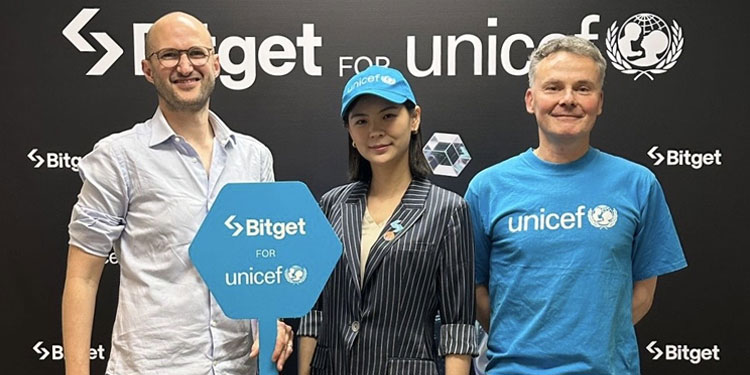
Bitget and UNICEF Unite to Promote STEM Skills for Girls
Cryptocurrency exchange Bitget has entered a strategic three-year partnership with UNICEF Luxembourg to promote digital literacy, STEM education, and blockchain awareness among young people, particularly adolescent girls, across eight countries. This collaboration seeks to empower girls in Armenia, Brazil, Cambodia, India, Kazakhstan, Malaysia, Morocco, and South Africa through structured educational programs focused on science, technology, engineering, and mathematics.
This initiative is part of UNICEF’s broader Game Changers Coalition, led by its Office of Innovation. The coalition comprises organizations and foundations such as the Global Video Game Coalition, the Micron Foundation, and Women in Games, all of which share the common objective of equipping 1.1 million girls with vital tech and blockchain competencies by the year 2027. Through this partnership, Bitget aims to reach around 300,000 participants, including adolescents, parents, educators, and mentors, who will engage with various components of the program.
A major portion of Bitget’s involvement is supported by its $10 million Blockchain4Her initiative, which is designed to foster women’s digital empowerment and financial independence. This initiative includes elements such as mentorship, funding opportunities, and customized learning materials specifically curated for female learners. Bitget also plans to connect UNICEF with leading Web3 developers and blockchain protocol representatives who can serve as mentors and technology partners, thereby enriching the program with real-world technical insight.
Bitget’s leadership emphasized the importance of closing the gender skills divide by focusing on STEM education for adolescent girls. They conveyed that the organization is actively working with UNICEF to create a scalable framework that integrates blockchain education into global learning environments. Contributions from experienced Web3 professionals are expected to ensure the curriculum remains practical, up-to-date, and accessible to learners in diverse socioeconomic contexts.
Current global trends reveal that adolescent girls and young women in low- and middle-income countries are disproportionately affected by limited access to the internet and digital tools. This disparity translates into an estimated $15 billion in lost economic opportunities annually, largely due to their underrepresentation in digital competencies compared to male peers. As digital skills are now considered essential for approximately 90% of jobs, the Bitget–UNICEF collaboration addresses a pressing developmental challenge.
@bitgetglobal is partnering with UNICEF Luxembourg to support @UNICEFInnovate’s digital education efforts.
Through this partnership, Bitget joins the Game Changers Coalition and will help bring blockchain and digital skills to 300,000 young people, especially girls 🎮💡 pic.twitter.com/dklTE8XZbP
— UNICEF Luxembourg (@uniceflux) June 16, 2025
The initiative will also involve the development of UNICEF’s first interactive blockchain training module, crafted in cooperation with Bitget Academy, the educational division of the exchange. The module will blend both online and in-person formats and use game development as a medium for learning blockchain fundamentals. The gamified approach aims to make complex technical topics more digestible and engaging, especially given that billions globally already engage with video games as a form of entertainment and social interaction.
In addition to gamification, the broader ecosystem is witnessing the emergence of new educational models that integrate cutting-edge technologies like generative AI. A recent example is Giggle Academy, an initiative from former Binance CEO Changpeng Zhao, which is exploring AI-driven, free K–12 education for a global audience.
Through its partnership with UNICEF Luxembourg, Bitget is contributing to a transformative agenda that not only supports blockchain adoption but also promotes digital inclusivity for young women worldwide. By combining financial backing, educational innovation, and strategic mentorship, this initiative seeks to redefine access to future-ready skills in some of the world’s most underserved communities.

